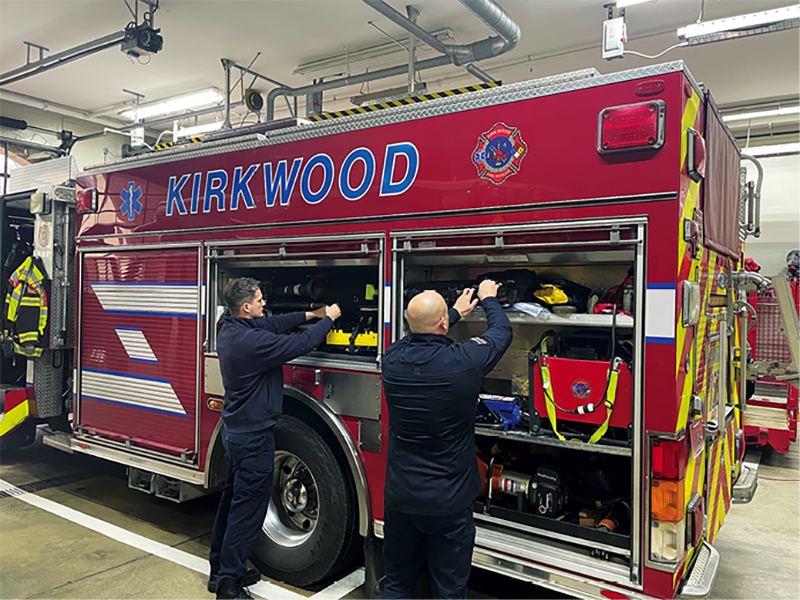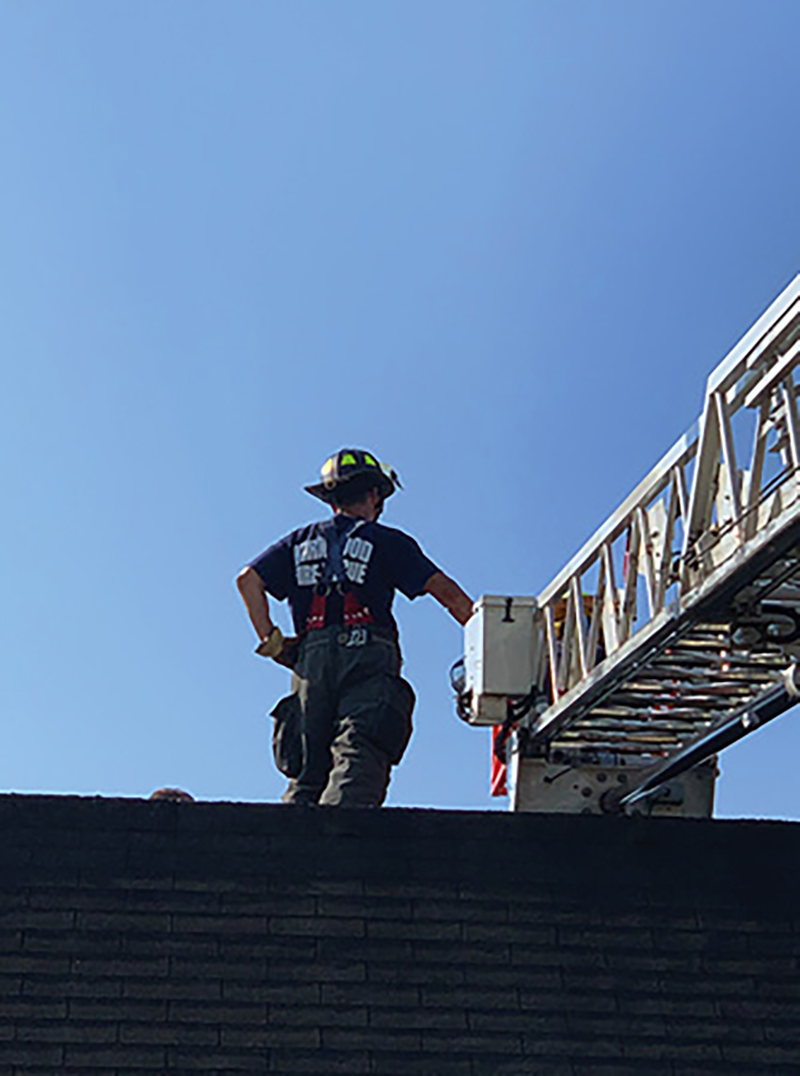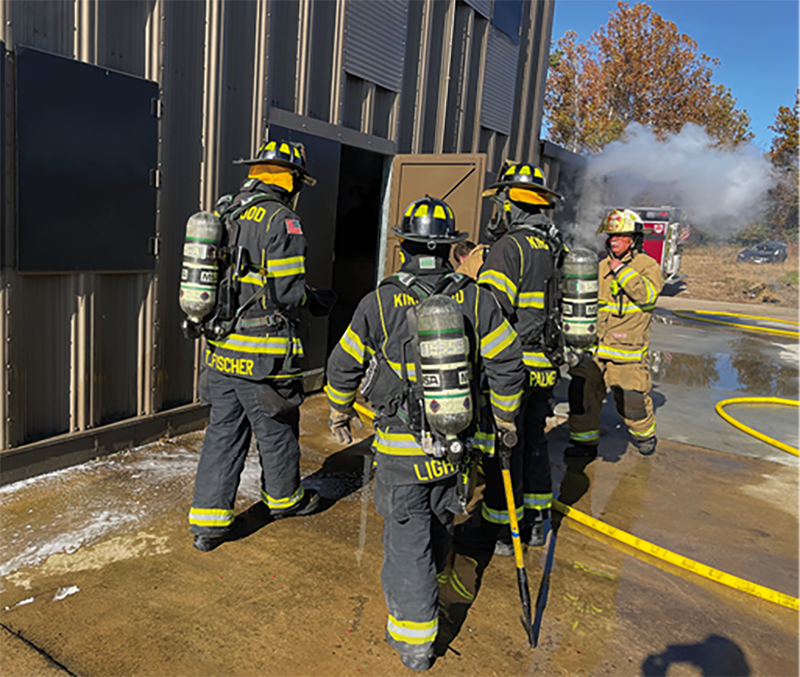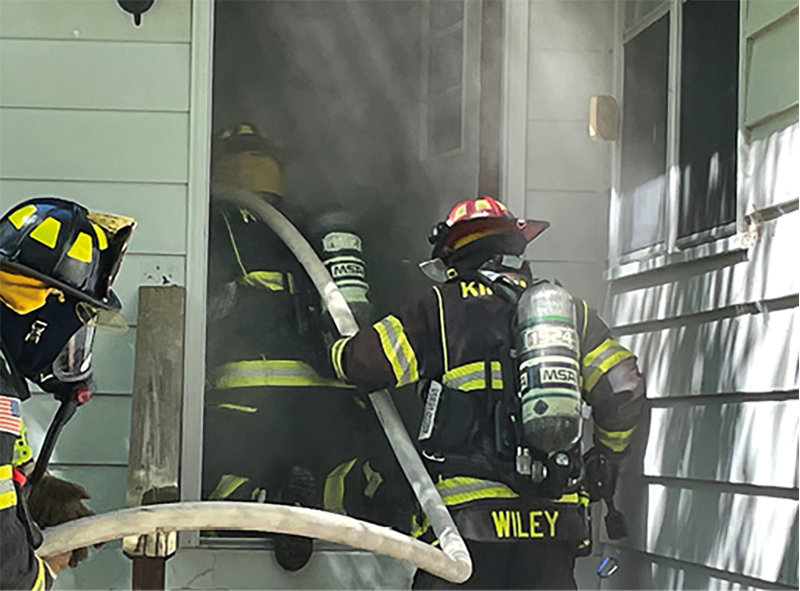“Aggressive” is the buzzword in today’s fire service. Go to any conference; the top filled classes all have “Aggressive” in their titles. Read any article, look at any blog, or have a conversation at a firehouse kitchen table—the word will come up. Is it all about making a grab, the push down the hallway, or working in “Jobtown”? The reality is, many firefighters will go their entire career without ever making a rescue. Similarly, many companies will only see one or two fires each year. Are these companies not “aggressive”? With these realities, what does being aggressive really mean?
- Being Aggressive Does Not Mean Being Reckless
- Aggressive and Practical Search: It’s Still About the Victim
- Aggressive Truck Functions for a Safer Fireground
- Aggressive Cooling and Preflashover Conditions
Aggressive is being able to handle the situation when it arises with safe, efficient, and effective operations. It is about crew continuity, synergy, and teamwork. It is about having a work ethic and pride in the job, knowing that the fire service is a calling, not a paycheck. This is all just feel-good talk; if you want to be aggressive, it takes action. Being aggressive requires planning, communications, constant training, and buy-in for success. It requires dedication and hard work; it’s not achieved in one meeting or in one shift.
The Company Officer
Looking at any aggressive company, you will find a strong company officer. Some say that the company officer can make or break a company; I say he can make or break a department. The company officer has the most critical role in the fire service, leading at the company level and ensuring success in the firehouse and on the fireground. He must be an advocate for his people and drive them to be all they can be, even when they do not see the greatness in themselves. He must be the company’s rudder, providing the direction, while the company is the motor , driving the department to new coasts. The company officer must desire to lead, strive to be the best, and be willing to make the tough calls to move the company in the right direction. It is the hardest yet most rewarding job in the fire service. You can’t be aggressive without a competent, courageous, and confident company officer.
Mission, Vision, and Values in Action
The strong, smart company officer takes his crew to that all-desired aggressive level by getting everyone to buy in and be on the same page. It is not easy, since it is hard enough to get a crew to agree on a dinner menu, much less come together on a plan. But it takes a plan, which starts with what we do—our mission. Every fire department has a stated mission; so should every company. It need not be long but should be meaningful and truly reflect what they do. For example, “Saving Life and Property” is a simple yet effective mission that dictates the crew’s daily actions.
Vision is what we want to do or where we want to be: “Strive to be a progressive engine company optimally operating for the citizens.” Again, it’s nothing crazy long but just the daily actions that should drive us toward achieving that vision.
Our values are what we believe in; they are what we do and drive our actions at our core. Integrity, honesty, hard work, teamwork, and so on are all great, but these are typical of organizations. At the company level, look for values that are expressed in action: Every Day Is a Training Day, Health and Fitness, Progression, Safety. These values in action are the foundation to drive the daily actions of the crew.

(1) Truck checks are a team effort. Conducting them at the same time and in the same manner creates a routine leading to enhanced proficiency and muscle memory. (Photos by author.)
The Plan
Now comes the plan. Take and develop goals with your crew to achieve the “Progressive Engine Company” or “Can-Do Rescue.” These goals might include timed evolutions, achieved skill sets (technician level or driver qualifications), professional development, and team building. After you have determined your goals, it is time to determine your actions—how you are going to achieve the stated goals; goals are dreams without actions. For example, if you desire to have all members driver qualified, your action should be to enroll members in the quarterly driver program through the training division. If you want to be a stronger team, your actions should be conducting a minimum of one company training session and eating a minimum of one meal together as a company. The key is goals that are achievable and that everyone buys into so they can be held accountable. Once the plan is in place, the company officer must hold members to task, conduct the training, and communicate at a high level. Note that the plan is only one part, the framework and the map for success; it will require much more to become aggressive.
Routines
A routine is another key to becoming an aggressive company. Such companies have a routine or process that they perform on the fireground and in the firehouse. Routines assist all of us to stay on track; aggressive companies take this further and have daily processes, procedures, and actions that keep them focused and mission-driven. The daily routine organizes their activities—how and when they perform truck checks, training, inspections, chores, physical fitness, and so forth. The routine ensures that everything is completed and it also lets everyone know what they are doing that day and what to expect, again assisting in proficiency. For example, truck checks are a team effort. Conducting them at the same time and in the same manner creates a routine leading to enhanced proficiency and muscle memory (photo 1).
The same holds true on the fireground. The routine provides the framework for actions, often planned out in standard operating procedures (SOPs). With this system, the crew has a solid playbook that allows members to be aggressive, no different than a professional sports team.
SOPs are critical for success. You don’t just cut and paste your fire department logo on top of another organization’s SOP. SOPs must be crafted to meet your organization’s needs, including your apparatus, response area, staffing, building construction, and water supply. Instead of a chore, this is an opportunity for aggressive companies who desire SOPs and strive to be part of them since they want to have a direct influence on operations and dictate how a fire or an emergency scene will go. No quarterback goes up to the line without a called play; as firefighters, we should not go to a scene without a game plan but, like the quarterback, we can call an audible if needed and if conditions dictate.
Work Ethic
An aggressive company must have a strong work ethic. Many believe that today’s generation lacks the work ethic of previous generations. I challenge that; today’s generation has had less leadership than the previous one. Work ethic is all about doing the job and doing it right, doing what needs to be done and not complaining. It involves putting in the work early and often so that, in the end, you reap the rewards and see the benefits. A strong work ethic can be taught and can be learned. The key is that the followers mimic the work ethic of the leader. If you want your company to have a strong work ethic, be a company officer with a strong work ethic and display it daily.
Attitude
Aggressive companies are said to have an attitude or swagger. Note there is a difference between confident and cocky; most cocky companies couldn’t perform under pressure and know it, but confident companies have nothing to prove since their actions speak for themselves on the fireground. Often, aggressive companies operate with less-than-optimal apparatus and equipment, which would seem to be an impediment but, to the aggressive, it is just another challenge that will not stand in their way.
The aggressive company maintains a positive attitude and does not let anything get in the way of their effectiveness. They are all about being there for the public, doing what is right, and being mentally and physically prepared for any situation. Such companies collectively stay positive, looking for solutions rather than problems. They understand that it is a privilege to walk into work at a firehouse each day and that it is more than a job; it’s a calling. If you want to be aggressive, maintain a positive attitude.
Aggressive companies are driven and desire to be aggressive, recognizing that this job can kill you, so they are driven to train and learn. They will put in the work to be the best and truly driven to do what is right. The goal of an aggressive company should not just be the best but rather be better today than they were yesterday. This constant desire to improve will lead to a driven mindset.
This drive coincides with engagement. Aggressive companies consist of members who are engaged in the job, on and off duty. I am not saying that you have to live and breathe the fire department, but engaged members will see actions taken off duty such as class attendance and training as opportunities to improve themselves and their company. It is not viewed as a requirement but rather an opportunity. If you want to be aggressive, engage your members and drive them to be engaged in the job.
Building Construction
You cannot know enough about construction. For firefighters, this is our battlefield, and we must know all there is before we go into battle. I do not mean construction as in knowing what Type I construction is but also knowing how a Type I reacts under fire conditions, what the firefighter hazards are, and what issues firefighters will face in Type I. Yes, being able to define construction type is important, but aggressive firefighters and aggressive companies know it is much more and recognize that knowing how it will affect their operations will enhance their ability to respond and thus their ability to be aggressive.
Response Area
Similarly, you need to know your area, get out of the firehouse, and walk through your building stock. If in a commercial area, get with building management and walk through the buildings during both peak and nonpeak hours, identify their operations, look for firefighter hazards (i.e., what will trip you up at 3 a.m.), review the alarm panel and the associated suppression systems, get on the roof, and feel what a roof feels like; your first time on a commercial roof should not be for ventilation (photo 2). If you are in a residential neighborhood, walk the streets; see what is going on with new construction, remodels and renovations, building materials, design, and whether they have basements. You can’t be aggressive if you don’t understand construction and what you have in your first-due district.

(2) Get out and train! Aggressive companies are out of the firehouse and in buildings and on roofs, understanding the construction and occupancies they will face.
Training
Training and drills are the second most important mark of an aggressive company after response. For aggressive companies, training is a priority and a part of their daily operations. Company training can occur anywhere. The kitchen table is a great place to meet and discuss equipment and SOPs. Aggressive companies also understand the importance of drills, which hone skills and improve proficiency. For them, such activities are as normal as coffee in the morning. Instead of just saying, “Every day is a training day,” aggressive companies train daily on situations they will face in their response area. Their training is interactive, building on skill sets that will improve the company. Training is an opportunity to provide value to the company and have the company provide value to the members. According to Maslow’s hierarchy of needs and self-actualization, as humans, we desire to provide value and feel valued. Company-level training fulfils this need, especially for companies that are not routinely running fires or rescues. Daily training with solid objectives based on standards, job performance requirements, and SOPs will build an aggressive company.
Training need not be long and drawn out; rather, it should focus on an objective and its completion, such as hose deployment, laddering a roof, or forcing a door. The hard part is drilling and taking these evolutions to the next level. Skills repetition is how we truly perfect and hone these techniques and build muscle memory. Athletes practice multiple times on the same play until they can’t get it wrong. As an aggressive company, we must maintain that same mindset, training and drilling until we cannot get it wrong. If you want to be aggressive, make training a priority, train every day, and drill until you cannot get it wrong (photo 3).

(3)The training grounds are the practice field; this is the time to work out the kinks and ensure everyone is on the same page before the big game.

(4) You can’t be aggressive if you do not learn from your mistakes and grow from each experience.
Training is only second to responses, where all the hard work, time, and effort come to fruition. Not every response will be perfect, but every response is an opportunity to learn. Aggressive companies take the opportunity learn by holding after-action reviews and tailboard talks to review the incident, identify the good and the bad points, and thus learn for the next alarm. You cannot be aggressive if you do not learn from your mistakes and grow from each experience (photo 4).
Aggressive is not a bad word in the fire service as long if it means a company mentality that breeds teamwork, synergy, and effort. Becoming and, more importantly, staying aggressive take action. Members must have the right attitude, be driven, and recognize that training is at the core of the aggressive company. The fire service needs more aggressive companies!
BRIAN ZAITZ is the assistant chief of operations and training for the Kirkwood (MO) Fire Department with 22 years of service. He has an associate of applied science degree in paramedic technology, a bachelor of science degree in fire science management, and a master’s of science in human resource development and is a graduate of the National Fire Academy’s Executive Fire Officer Program.

